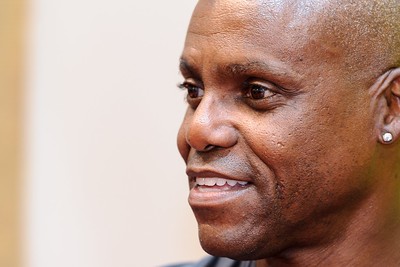In the realm of athletics and sporting excellence, the role of a well-balanced diet cannot be overstated. This essential element bolsters not only performance but also influences recovery and endurance. Amidst discussions about optimal diets for athletes, the name Carl Lewis frequently emerges, igniting curiosity and questions surrounding his dietary choices.
A pivotal query that resonates amongst fans and fellow athletes alike is, “Is Carl Lewis vegan?” The answer, affirmative and inspiring, unveils a multifaceted journey embedded in commitment, consciousness, and a relentless pursuit of unparalleled athletic prowess. Carl Lewis’s resolute embrace of veganism underscores the vital connection between dietary choices and exceptional athletic performance, paving a path for many to explore and consider.
Delve into the ensuing segments as we unfurl Carl Lewis’s voyage towards veganism. Understand the impact of a plant-based diet on his monumental athletic achievements, the intricacies of his nutritional regimen, the obstacles encountered, and his impassioned advocacy for veganism. Additionally, the discussion extends to other eminent vegan athletes, amplifying the narrative of veganism’s profound influence on physical excellence and well-being.
Is Carl Lewis Vegan?
Yes, Carl Lewis is indeed a vegan.
When did Carl Lewis turn vegan?
Carl Lewis turned vegan in the early 1980s. He attributes his exceptional athletic performance to his plant-based diet.
- Year: 1990s
- Reason: Improve athletic performance and overall health
- Influence: Research and consultation
Lewis’s transition to veganism was a carefully thought-out decision aimed at enhancing his athletic prowess and overall well-being. His commitment to a vegan lifestyle underscores the importance of diet in achieving optimal athletic performance.
How did veganism impact Carl Lewis’s athletic performance?

The impact of veganism on Carl Lewis’s athletic performance is notable:
- Improved Energy Levels: Lewis reported an increase in his energy levels.
- Shorter Recovery Times: The vegan diet contributed to shorter recovery times between training sessions.
- Enhanced Performance: Contributed to his winning of nine Olympic gold medals.
These impacts highlight the potential benefits of a vegan diet for athletes and individuals aiming to enhance their physical performance and health.
What does Carl Lewis’s vegan diet consist of?
Carl Lewis’s vegan diet is rich and diverse, including:
| Food Group | Examples |
|---|---|
| Leafy Greens | Spinach, Kale |
| Legumes | Beans, Lentils |
| Nuts and Seeds | Almonds, Chia Seeds |
| Fruits | Bananas, Berries |
These foods provide the essential nutrients necessary for maintaining his health, energy levels, and athletic performance.
What challenges did Carl Lewis face?
Lewis faced challenges in ensuring adequate calorie and nutrient intake, crucial for sustaining his high-intensity training.
- Caloric Intake: Ensuring enough calories were consumed to support energy needs.
- Nutritional Balance: Maintaining a balanced diet to receive all necessary nutrients.
He overcame these challenges through careful diet planning and continuous learning about vegan nutrition.
How does Carl Lewis advocate for veganism?
Carl Lewis is a vocal advocate for veganism:
- Regularly speaks about the benefits of various platforms.
- Emphasizes ethical, environmental, and health advantages.
- Inspires fans and fellow athletes to consider a vegan lifestyle.
His advocacy plays a crucial role in raising awareness about veganism and its potential benefits.
Who are other notable vegan athletes?
Besides Carl Lewis, other vegan athletes include Venus Williams, Tia Blanco, and Scott Jurek.
- Venus Williams: Professional tennis player. (Is Venus Williams Vegan? – Her Diet Plan)
- Tia Blanco: Professional surfer.
- Scott Jurek: Ultramarathon runner.
Frequently Asked Questions (FAQs)
How did a vegan diet impact Carl Lewis’s athletic performance?
Carl Lewis reported significant improvements in energy levels, recovery times, and overall athletic performance after adopting a vegan diet. His diet played a crucial role in his winning nine Olympic gold medals.
What does Carl Lewis’s vegan diet consist of?
Lewis’s vegan diet is rich and varied, including leafy greens, legumes, nuts, seeds, and fruits. He ensures his diet is balanced and nutrient-dense to support his energy needs and physical health.
Did Carl Lewis face any challenges as a vegan athlete?
Like many who transition to a vegan diet, Lewis faced challenges, especially ensuring he consumed enough calories and nutrients to support his high-intensity training and athletic performance. He overcame these challenges through careful dietary planning and education about vegan nutrition.
How does Carl Lewis advocate for veganism?
Carl Lewis is an active advocate for veganism, regularly speaking about its benefits on various platforms. He emphasizes the ethical, environmental, and health advantages of a vegan diet and inspires many to consider transitioning to a plant-based lifestyle.
Who are other notable vegan athletes?
Other notable vegan athletes include Venus Williams, Tia Blanco, and Scott Jurek. Like Carl Lewis, they have reported numerous benefits from adopting a vegan diet, reinforcing the positive impact of veganism on athletic performance and overall health.
Conclusion
In the vast realm of athletics, Carl Lewis stands out not only for his extraordinary accomplishments but also for his committed vegan lifestyle, a choice that played a pivotal role in enhancing his performance, health, and recovery times. Through his journey and advocacy, Lewis underscores the profound impacts of a vegan diet on individuals’ well-being and physical achievements. His path to veganism is not devoid of challenges, but his success in overcoming them offers valuable lessons and inspiration to many looking to embark on a similar journey.
As observed in the detailed exploration of his vegan lifestyle, from the nutritional composition of his diet to the numerous benefits realized, Carl Lewis’s experience serves as a compelling testament to the potential of a plant-based diet in fostering optimal athletic performance and promoting overall health. Beyond Lewis, other notable athletes, including Venus Williams, Tia Blanco, and Scott Jurek, further reinforce this narrative, adding to the growing body of evidence supporting veganism’s positive influence.
In closing, Carl Lewis’s vegan journey, highlighted in this comprehensive exploration, invites readers to consider the substantial benefits of adopting a vegan diet. It showcases the possibility of achieving and sustaining exceptional athletic performance, robust health, and a heightened sense of well-being through mindful dietary choices, thereby echoing the enduring connection between nutrition and holistic wellness.










